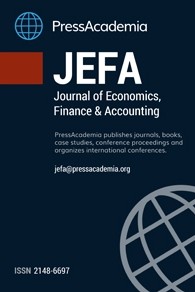POLITICAL STABILITY AND ECONOMIC GROWTH RELATION: THE CASE OF TURKEY AND TURKIC REPUBLICS
Purpose – The purpose of this study is to investigate the possible relation between political stability and economic growth in Turkey and Central Asian Turkic Republics namely, Azerbaijan, Kazakhstan, Kyrgyzstan, Uzbekistan, Tajikistan and Turkmenistan. By doing so, we will be able to conclude the effect of political stability on transition economies such as Turkic countries. Methodology – We employ panel data analysis methods which take cross section dependency into account. In this regard, we employ cross section dependency test and unit root tests. In the second step, we use panel unit root co-integration test. At the end we employ panel VAR causality and Köse and Emirmahmutoğlu Panel causality tests. Findings- Results imply that there is a uni-directional causality running from gross domestic product per capita to political stability. In country based analysis, it is seen that the causation linkage running from political stability to economic growth occurs in only Azerbaijan. In other countries, there is no relationship between variables. Conclusion- According to results, it is possible to conclude that political stability is not a pre-condition of economic growth in Turkic economies, except Azerbaijan. On the other hand, political stability might be a pre-condition of another macroeconomic indicator such as inflation, trade opennes and etc.
Keywords:
Central Asia, Political Stability, Economic Growth, Panel Data Causality,
___
- Asghar, N., Qureshi, S., & Nadeem, M. (2015). Institutional Quality and Economic Growth: Panel ARDL Analysis for Selected Developing Economies of Asia. South Asian Studies, 30(2), 381.
- Barak, O., & Abutalipov, M. (2016). Kazakistan Rusya Belarus Gümrük Birliği Anlaşmasının Kazakistan’ın Dış Ticareti Üzerine Etkisi. Uluslararası Afro-Avrasya Araştırmaları Dergisi, 1(2), 1-18.
- Breuer, B., McNown, R., Wallace, M. (2002). Seriesspecific unit root test with panel data. Oxford Bulletin of Economics and Statistics, 64, 527–46.
- Breusch, T., Pagan, A., (1980). The Lagrange multiplier test and its application to model specification in econometrics. Rev. Econ. Stud. 47, 239–253.
- Comeau, L. (1998). Regıme Type, Polıtıcal Stabılıty, and Economıc Growth. Doctoral Dissertation, University of Illinois at Chicago.
- Curvale, A.C. (2010). Does Political Participation A_ect Political Stability? A Study of Latin America During the Nineteenth and Twentieth Centuries. Doctoral Dissertation, New York University.
- Çalışkan, Z. D. (2019). Political Stability and Financial Development: Evidence from Turkey. Fiscaoeconomia, 3(3), 72-79.
- Çetin, A. B. (2019). İktisadi ve Politik Kurumların Ekonomik Büyüme Üzerindeki Etkisi: Gelişmiş Ülkeler ve Yükselen Piyasa Ekonomileri Karşılaştırması. Bulletin of Economic Theory and Analysis, 4(2), 1-31.
- Dikkaya, M., & Demirci, O. (2013). Petrol Doğal Gaz ve Ötesi: Modern Azerbaycan’da İlham Aliyev Döneminin Ekonomi Politiği. Çağrı Erhan (Edt.). Kafkasya’nın Yükselen Yıldızı İlham Aliyev Döneminde Azerbaycan, 201-225.
- Emirmahmutoğlu, F. And Kose, N. (2011), “Testing for Granger Causality in Heterogeneous Mixed Panels”, Economic Modelling , 28, 870–876.
- Gökalp, M. F., & Baldemir, E. (2006). Kurumsal yapı ve ekonomik büyüme ilişkisi. Dokuz Eylül Üniversitesi Sosyal Bilimler Enstitüsü Dergisi, 8(1), 212-226.
- Kamacı, A. (2019). Politik İstikrarsızlık-Ekonomik Büyüme İlişkisi: 20 OECD Ülkesi İçin Panel Veri Analizi. Başkent Üniversitesi Ticari Bilimler Fakültesi Dergisi, 3(2), 75-85.
- Karakuzu, T., & Limon, İ. (2019). Politik İstikrarsızlık ve Tunus. Electronic Journal of Political Science Studies (EJPSS), 10(2).
- Park, H.K. (1982). Polıtıcal Development And Polıtıcal Stabılıty East and Southeast Asıa. Doctoral Dissertation, Cincinnati University.
- Pesaran, Hasem, M., (2004), “General Diagnostic Tests for Cross Section Dependence in Panels”, Working Paper No:0435, University of Cambridge.
- Pesaran, M. H. (2007). A simple panel unit root test in the presence of cross‐section dependence. Journal of Applied Econometrics, 22(2), 265-312.
- Pesaran, M. H., & Yamagata, T. (2008). Testing slope homogeneity in large panels. Journal of Econometrics, 142(1), 50-93.
- Pesaran, M.H., Ullah, A., Yamagata, T., (2008). A bias-adjusted LM test of error cross section independence. Econometrics Journal 11, 105–127.
- Sekrafi, H., & Sghaier, A. (2018). Examining the relationship between corruption, economic growth, environmental degradation, and energy consumption: a panel analysis in MENA region. Journal of the Knowledge Economy, 9(3), 963-979.
- Turan, İ., Demez, S., & Kızılkaya, F. (2019). NIC Ülkelerinde Politik İstikrar ve Ekonomik Büyüme İlişkisi. Siirt Üniversitesi Sosyal Bilimler Enstitüsü Dergisi, 7(14), 485-499.
- Yılmaz, A. (2019). Politik İstikrar Endeksi – Ekonomik Göstergeler Arasındaki Etkileşim: Türkiye ve Seçilmiş Ülkeler İçin Bir Araştırma. Marmara Üniversitesi Sosyal Bilimler Enstitüsü, Yayınlanmamış Yüksek Lisans Tezi, İstanbul
- Yayın Aralığı: Yılda 4 Sayı
- Başlangıç: 2014
- Yayıncı: PressAcademia
